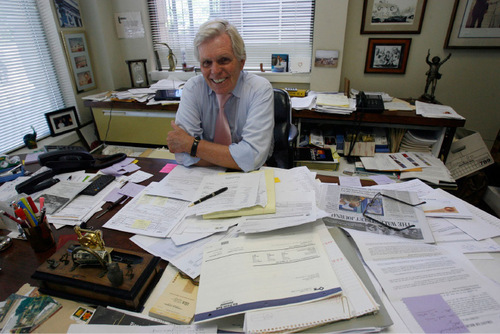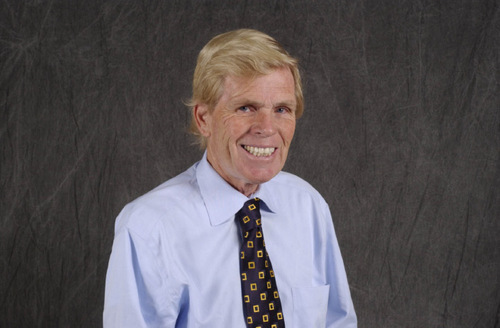This is an archived article that was published on sltrib.com in 2010, and information in the article may be outdated. It is provided only for personal research purposes and may not be reprinted.
For months, there was nothing.
Republican Steve Harmsen didn't raise any money, send out any mailers or post any billboards to further his Salt Lake County Council campaign in Salt Lake City's decidedly Democratic District 1.
But times have changed.
Despite his long odds against Democratic front-runner Arlyn Bradshaw, the Republican businessman has ramped up his race — and his rhetoric — in recent weeks to compete in a district that hasn't elected a Republican mayor since the 1970s and has chosen Democrats, almost exclusively, to represent it in the Utah Legislature.
Harmsen has challenged his opponent's stance on having government help build a convention center hotel (the county has no place in the lodging business, the Republican argues) and accuses Bradshaw of abusing his position as a staffer to outgoing County Councilman Joe Hatch by holding down another job on the side at the University of Utah ("It is an affront to double dipping," Harmsen says).
But Bradshaw, characterizing Harmsen's attacks as "pretty low," has made his campaign less about his opponent and more about him being a "better fit for the district."
Bradshaw favors a Salt Lake City-like mutual-commitment registry for gay and lesbian couples in unincorporated burbs such Millcreek and Magna. He backs an expanded arts district downtown and a hotel that would help the Salt Palace better compete for conventions. He maintains open-space money should be spent along the Jordan River and supports the idea of another open-space bond once the economy recovers.
"My policy priorities are more in line with the district," Bradshaw says. City residents want a councilman who "is willing to stand up and say something different than the dominant voices in Utah government."
As for the jab about his U. job, the Democrat says he did nothing improper.
Until recently, Bradshaw worked as a full-time aide to Hatch, the council's outgoing chairman. That changed Oct. 1, when Bradshaw trimmed his hours to three-quarter time and accepted a second job at the U. as assistant dean of students. Why? Because his county job won't be around next year. When Hatch leaves office, Bradshaw either will replace him as an elected official or lose his job when Harmsen takes over.
Harmsen argues the council needs more financial discipline, starting with its own staffers. The former county councilman — who served from 2001 to 2005 before being defeated by Democrat Jenny Wilson — says council assistants are paid too much for doing too little and should be consolidated.
"It is wrong," Harmsen says. "It needs to be changed, and Arlyn Bradshaw is making a mockery of it."
Harmsen promises to hold the line on taxes, eliminate the police fee and play a greater role in mental health (he accuses the council of shirking its oversight duties).
He says he also would encourage alternatives to incarceration, support increased rights for the lesbian, gay, bisexual and transgender community and push for more off-leash dog parks.
Bradshaw shares a few of those priorities: He wants to get rid of the police fee when sales taxes improve, puts a high priority on alternatives to incarceration and advocates more off-leash areas.
And yet Bradshaw, who has been working in the trenches of county government as a staffer for the past three years and would become the first openly gay Salt Lake County councilman, has some distinct differences. For one thing, he sees a government role in helping build up downtown.
"No one likes to visit a city," he says, "that has a ghost town for downtown."
Bradshaw wants to preserve the so-called Northwest Quadrant of Salt Lake City for open space and keep developers from shopping for better zoning in unincorporated areas. He wants to reduce the county's vulnerability to sales tax swings (which led to the law-enforcement fee) by encouraging the Legislature to let counties impose the same franchise fees as cities.
He wants to preserve social programs such as adaptive recreation for people with disabilities. And he says the council did the right thing by cutting budgets and raising taxes to keep intact those services and the county's coveted triple-A bond rating.
"I want to make sure," Bradshaw says, "that we continue to provide quality services."
Arlyn Bradshaw
Age » 29
Family » Partner, Neil Webster.
Party • Democrat
Education » Bachelor's degree in political science from the University of Utah, currently completing a master's degree in public administration from the U.
Occupation » Staffer to county Councilman Joe Hatch and assistant dean of students at the U.
Civic career experience » Executive director to the Utah Democratic Party, staff member to former Utah House Minority Whip Patrice Arent, aide to Rep. Jim Matheson, former president of the Lesbian and Gay Student Union and College Democrats at the University of Utah.
Interesting fact » He's a "rabid" U. of U. sports fan. —
Steve Harmsen
Age » 68
Family » Wife, Kelly; six children.
Party • Republican
Education » Bachelor's degree in accounting from the University of Utah, law degree from George Washington University.
Occupation » Owner of Steve Regan Co.
Civic political background » Salt Lake City commissioner from 1972-76; Salt Lake County councilman from 2001-05.
Interesting fact • While in Calcutta, India, Harmsen and his wife met privately with Mother Teresa. She asked if they would take some letters and mail them in the United States to save on postage. –
Priorities for District 1
Once tax revenues rebound, where is the first place that you would consider reinvesting money?
Bradshaw • Salt Lake County's employees have borne a significant burden in helping the county balance its general fund. I would want to see the county restore the 2.75 percent pay cut employees took in 2010, as well as reinstate county contributions to employee 401(k) plans. In the municipal fund, the council needs to live up to its commitment to adjust downward, and eventually eliminate, the need for the Salt Lake Valley Law Enforcement Service Area to impose a fee.
Harmsen • Now that is an optimistic note and a very unlikely one. Additional money will only come with additional growth, which must be used for serving the additional growth; or higher taxes, which I am against; or a radical change in the way property taxes and exemptions are collected and distributed by the county and state, which I am in favor of. Additional money should be used for improving our jail, mental health and open-space funding.
Where do you stand on the county lending support to the construction of a convention center hotel near the Salt Palace?
Harmsen • I am against the county mortgaging any of the tax base to fund a downtown hotel to prop up questionable past mortgages and decisions. "Build it and they will come" is not good government policy. I participated in the formulation and implementation of the University of Utah Research Park, whose model has been very successful, and I would suggest a similar model for any downtown hotel development.
Bradshaw • Salt Lake County has made a significant investment in the Salt Palace Convention Center. In recent years, the Convention and Visitors Bureau has indicated we are losing business to other cities that have convention headquarters hotels. I am supportive of constructing a hotel to drive economic development, so long as the following criteria are met: No existing tax revenues are used; government will not own or manage the hotel; and increment financing and bond guarantees must be done in partnership with Salt Lake City and the state.
What do you consider the most pressing priority for your district?
Bradshaw • Environmental protection, improving air quality and protecting open space are extremely important to me, but require a regional effort. Specific to District 1, my priority will be policies that promote a vibrant downtown. Urban planning that utilizes public transportation corridors and clusters entertainment venues are regarded as best practices.
Harmsen • I would focus on open-space acquisition, replacing or remodeling of the Central City Community Center, mental health funding and alternatives to incarceration, and not necessarily in that order.





